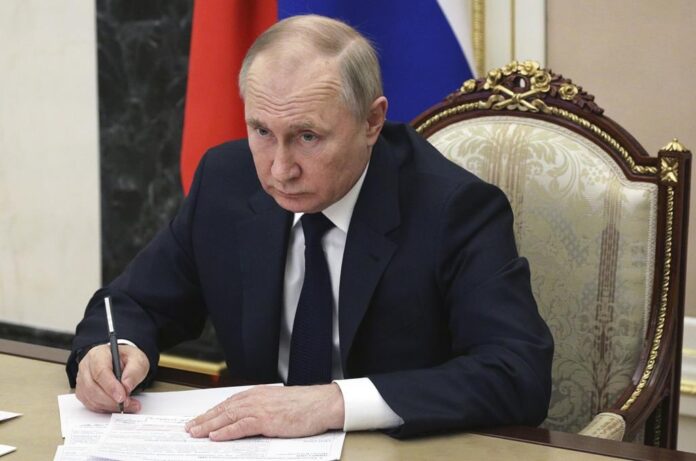Russia will seek payment in roubles for gas sales from “unfriendly” countries, President Vladimir Putin said on Wednesday, sending European gas prices soaring on concerns the move would exacerbate the region’s energy crunch.
European countries’ dependence on Russian gas and other exports has been thrown into the spotlight since Moscow’s Feb. 24 invasion of Ukraine and the subsequent imposition of Western sanctions aimed at isolating Russia economically.
“Russia will continue, of course, to supply natural gas in accordance with volumes and prices … fixed in previously concluded contracts,” Putin said at a televised meeting with top government ministers.
“The changes will only affect the currency of payment, which will be changed to Russian roubles,” he said.
Russian gas accounts for some 40% of Europe’s total consumption and EU gas imports from Russia have fluctuated between 200 million to 800 million euros ($880 million) a day so far this year. The possibility a change of currency could throw that trade into disarray sent some European and British wholesale gas prices up around 15-20% on Wednesday.
Russia-Ukraine conflict: NATO tells Russia ‘nuclear war cannot be won and should never be fought’
The Russian rouble briefly leapt to a three-week high past 95 against the dollar before settling close to 100 after the shock announcement.
Putin said the government and central bank had one week to come up with a solution on how to move these operations into the Russian currency and that gas giant Gazprom GAZP.MM would be ordered to make the corresponding changes to gas contracts.
Trending Stories
Jamaica to remove ties to monarchy as soon as William and Kate leave, sources say
Notorious Canadian sniper rumoured to have died in Ukraine is alive and well
With major banks reluctant to trade in Russian assets, some big Russian gas buyers in the European Union were not immediately able to clarify how they might pay for gas going forward.
“At the moment, we do not yet wish to comment. We will be in touch once we have formed an opinion,” said a spokesman at Germany’s Uniper.
Moscow calls its actions in Ukraine a “special military operation” to disarm and “denazify” its neighbour. Ukraine and Western allies call this a baseless pretext for a war of choice that has raised fears of wider conflict in Europe.
A BREACH OF RULES
According to Gazprom, 58% of its sales of natural gas to Europe and other countries as of Jan. 27 were settled in euros. U.S. dollars accounted for about 39% of gross sales and sterling around 3%.
The European Commission has said it plans to cut EU dependency on Russian gas by two-thirds this year and end its reliance on Russian supplies of the fuel “well before 2030”.
But unlike the United States and Britain, EU states have not agreed to sanction Russia’s energy sector, given their dependency.
READ MORE: NATO summit a chance to bolster Ukraine response, experts say. Here’s what to expect
The Commission, the 27-country EU’s executive, did not immediately respond to request for comment.
There are questions over whether Russia’s decision constitutes a breach of contract rules.
“This would constitute a breach to payment rules included in the current contracts,” said a senior Polish government source, adding that Poland has no intention of signing new contracts with Gazprom after their current long-term agreement expires at the end of this year.
‘This war is unwinnable:’ UN secretary-general urges Russia, Ukraine to negotiate end to war
Russia drew up a list of “unfriendly” countries, which corresponds to those that imposed sanctions. Among other things, deals with companies and individuals from those countries have to be approved by a government commission.
The list of countries includes the United States, European Union member states, Britain, Japan, Canada, Norway, Singapore, South Korea, Switzerland and Ukraine.
Some of these countries, including the United States and Norway, do not purchase Russian gas.
-Reporting by Reuters reporters; writing by Nina Chestney; editing by Catherine Evans and Carmel Crimmins
© 2022 Reuters



